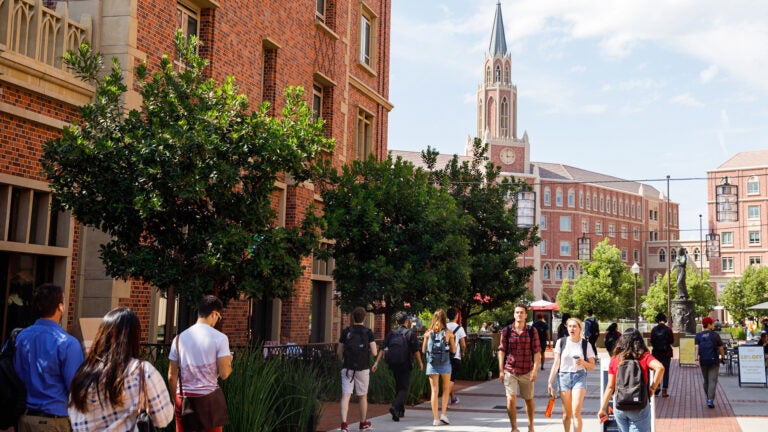
The STARS College Network will build on efforts to create new pathways for potential students who might not otherwise be aware of the range of educational opportunities available to them. (USC Photo/Gus Ruelas)
To recruit rural students, USC joins national network of top-tier universities
Doubling down on a commitment to access, USC, Caltech, Yale, Vanderbilt and a dozen other leading institutions are reaching out to young people in small towns.
USC is deploying a new initiative to help students from small-town and rural America enroll in, succeed at and graduate from the undergraduate program of their choice.
The university has joined the STARS College Network, a partnership of 16 leading universities across the country. STARS (Small-Town and Rural Students) will build on efforts to create new pathways for those who might not otherwise recognize the full range of educational opportunities available to them.
The STARS College Network is funded by a $20 million gift from philanthropist Byron Trott.
STARS College Network: powerful group of schools committed to rural students
The STARS College Network includes Ivy League universities such as Brown University and Yale University, top state schools including The Ohio State University and the University of Maryland, and other leading private institutions such as Colby College in Waterville, Maine. USC and Caltech are the only STARS members in the West.
USC will focus its efforts on students living in small towns and rural communities as defined by the U.S. Department of Health and Human Services’ Health Resources and Services Administration determination of areas eligible for U.S. government rural health funding and high schools identified by the National Center for Education Statistics.
“We already have bright, talented and ready students coming from small-town and rural communities across the country, but there are undoubtedly many whom we don’t reach or who do not know what opportunities USC has to offer them,” said Kedra Ishop, USC vice president for enrollment management. “Diversity is multifaceted. For too long, students living in small-town and rural areas have had limited access to the full breadth of educational opportunities in higher education that they deserve.
“We want them to know about us and to learn how an education with us — or one of our peers — can be transformative to themselves and their communities,” Ishop said. “The choice is theirs. Whether they end up here or not, they deserve the same opportunity to join and contribute to the communities of top-tier universities as any other young person in the U.S.”
(Story continues below video)
As part of the STARS College Network, USC will build on existing efforts to connect with small-town and rural high schools. Over the past four years, the university has admitted about 650 rural students as a result of outreach to less populated areas.
Small-town and rural students have represented just over 2% of the USC freshman class in recent years. STARS may help the university draw more applicants from those areas as it enables the university to connect with students it may not have otherwise.
Overcoming obstacles unique to rural students
Students from rural areas and small towns are underrepresented at most top-tier colleges and universities. With challenges created by distance and isolation, they may be less likely to encounter ads and media coverage of institutions, have visits from admissions personnel or attend events on campuses. In addition, they may not know adults who are familiar with the full spectrum of college opportunities.
Many rural high schools do not have dedicated college counselors.
Perhaps most importantly, many rural students may not have access to information about the vast financial aid opportunities available to them.
USC offers financial aid to meet the need. A full two-thirds of USC’s entering first-year class received some form of financial assistance, with approximately 20% receiving a merit-based scholarship.
An ocean of educational opportunity
Yohanna Bauerdorf, a second-year student at USC studying communications and entertainment, is from Browns Mills, N.J. The daughter of a Colombian immigrant, Bauerdorf graduated near the top of a class with fewer than 200 students.

“A few of us enrolled in community college, but others didn’t have any education plans past high school,” Bauerdorf said. “Education is promoted, but it seemed so out of reach.”
Like many aspirational students from rural areas, Bauerdorf wasn’t versed in the lexicon of college applications, nor was she familiar with big-name colleges and universities.
“I was a big fish in a little pond who needed to swim out into an ocean to find out what was out there for me in the way of college,” Bauerdorf said.
Bauerdorf recalls that she was fascinated by a YouTube video showing a newly minted USC student opening their offer of admittance.
“I didn’t know why they were so excited,” she said. “I didn’t even know what USC was.”
Bauerdorf then turned to YouTube to teach herself about college opportunities. She eventually made her way west.
Bauerdorf, who now serves as a tour guide for prospective students at USC, sees STARS as an opportunity to change the way young people in rural areas think about higher education.
“It’s not so much that we’re trying to convince students to come to USC,” she said. “The idea is to encourage student to want to invest in post-secondary education. This initiative could uplift rural students and help them overcome that fear that keeps them out of college. It would be groundbreaking to see that switch.”
STARS College Network bridges geographic divides with ongoing support
In addition to financial aid education, USC and other STARS College Network colleges and universities will provide a variety of recruitment and enrollment programming, which may include:
- Pipeline programs that bring students from rural communities and small towns to campus over summer break to help them prepare academically and socially for college.
- On-campus events for prospective students from rural areas and small towns, including flying students in from their hometowns.
- Expanded visits by college admissions staff to high schools in small towns and rural communities.
- Support for students in the college application process, including workshops and sessions designed to help students throughout their college search.
- Fly-in and virtual programs for counselors, teachers and administrators from rural and small-town high schools to help them better support their students on the path to college.
- Partnerships with local and national businesses to provide internships and job opportunities for the next generation of rural America.
Increased enrollment of students from small-town and rural communities across the country will help USC and partner institutions achieve even more multifaceted diversity in traditional metrics, such as first-generation students, racial/ethnic diversity and low-income students.
A vision of inspiration
College graduates from rural areas often return to their communities, supporting upcoming students who aspire to attend top universities nationwide.
USC and other STARS members hope to inspire other institutions, alumni, philanthropists and policymakers to increase their efforts to support students in rural areas and small towns.
With the launch of STARS, Trott-affiliated philanthropies have devoted more than $50 million to supporting students from small towns and rural communities, including the rootEd Alliance, which has teamed up with other philanthropies and the states of Missouri, Texas, Tennessee and Idaho to train and place dedicated college counselors in local high schools that did not previously offer that service to students.



